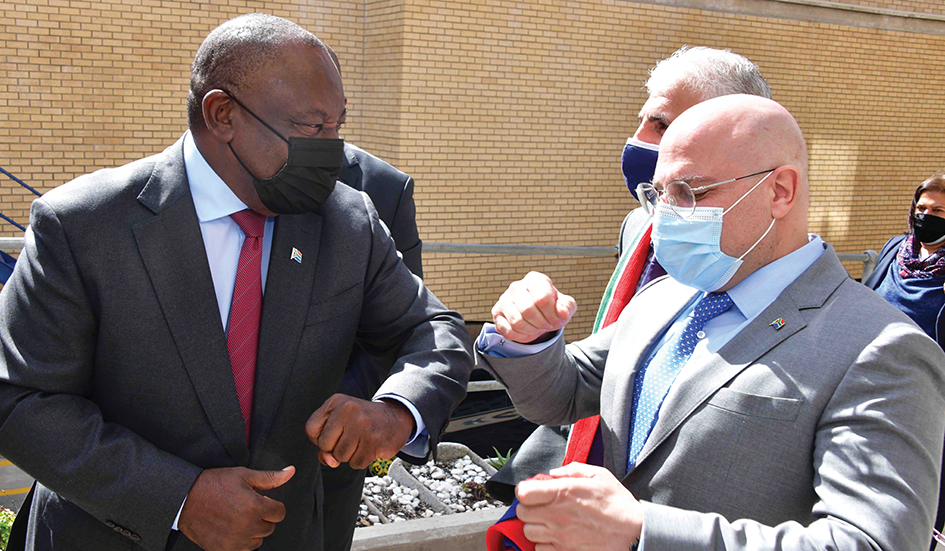Mending the economy
Mending the economy vuyelwanWhile there is no single remedy to rid the country of its challenges, South Africa remains a good place to inject investment.
“South Africa is open for business on many different fronts; we have very good infrastructure, a good financial system and good human capital and talent pool to draw from,” notes Group Senior Executive for Strategic Trade at Aspen Pharmacare, Dr Stavros Nicolaou.
Nicolaou’s comments were in relation to the fourth edition of the South African Investment Conference (SAIC), which was on 24 March at the Sandton Convention Centre in Johannesburg.
In April 2018, President Cyril Ramaphosa announced that South Africa would host an investment conference with the aim of raising R1.2 trillion over a five-year period.
Since its initial launch in 2018, the SAIC has drawn delegates from South Africa and the world. The conference, which was held annually until 2020, showcased investment opportunities available in the country.
The fourth SAIC which was meant to be held in November last year, was postponed due to a number of reasons including that the country would have a far greater Coronavirus Disease (COVID-19) vaccination coverage, making travelling and gathering easier.
Since the start of the conference, South Africa has attracted R770 billion in commitments across a wide range of economic sectors.
Aspen was among the list of companies that raised their hands in the drive to attract investment to the southernmost country on the continent. 
The pharmaceutical company pledged to invest R3.4 billion at the inaugural conference in 2018 and to date, the full investment has been realised.
“That investment means our South African facility in Gqeberha, that we made a pledge for, is now one [of], if not the world’s largest, manufacturer and supplier of general anaesthetics. It is also the first site for the production of the COVID-19 vaccine on the African continent,” Nicolaou says in an interview with Government Communication and Information System (GCIS).
The local company, which has been operating for over two decades, has a presence in over 50 countries with its flagship manufacturing assets based in Gqeberha in the Eastern Cape.
The sterile facility contains state-of-the-art pharmaceutical equipment and systems used to manufacture advanced sterile medicines, including vaccines. The company has played a role in responding to pandemics such as HIV and AIDS, multi-drug resistant TB and most recently, COVID-19.
In the early onset of the COVID-19 pandemic, Aspen was a significant supplier - both domestically and in other parts of the world like Europe - of general anaesthetics and muscle relaxants needed to ventilate patients.
The company was also the first African country to produce the COVID-19 vaccine under contract manufacturing for Johnson & Johnson (J&J), the majority of which have gone into African arms. Aspen has produced close to 180 million vaccine doses.
Putting food on the table
The company, which also has manufacturing operations in East London as well as a chemicals facility in Cape Town, employs around 3 000 people at its manufacturing operations.
In a country facing high levels of unemployment, Aspen’s investment has helped many to put food on the table.
“The investment we pledged in 2018 has produced over 200 new jobs and these are highly skilled, high-tech jobs with a significant leaning towards an export orientation and, of course, our country needs exports.”
He adds that the work force at the plant in Gqeberha has mainly been drawn from New Brighton and other nearby areas.
Looking to the future
In keeping up with an ever-changing world, innovation is a critical aspect to growth for any company or economy and the company recently demonstrated this when it received the licensing rights for the J&J vaccine.
The agreement means that Aspen can now package, sell, as well as distribute J&J’s COVID-19 vaccines under its own brand.
“We will now have our own vaccine in Africa called Aspenovax, made in Gqeberha for South Africans [and] the African continent. We will not have a dependence on COVID-19 vaccines externally. We now have our own production base in South Africa. We will make sure that Africans are not left at the back end of the queue when COVID-19 vaccines are required,” he says.
Nicolaou urges investors to take the plunge and invest in South Africa.
“South Africans are generally hard working people, so if you make an investment in South Africa, I think you will be rewarded,” he says. – SAnews.gov.za